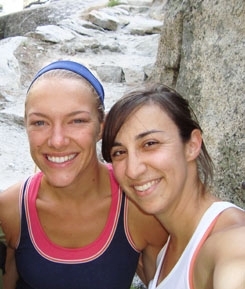
FeelGood is an innovative social enterprise that empowers college students to become global citizens, socially responsible leaders and entrepreneurs while taking an active role in the sustainable end of poverty.
Specifically, students create and run non-profit delis where they "give away" grilled cheese sandwiches for a voluntary donation. In addition to gaining critical business skills and inspiring their peers, they invest 100% of their profits in organizations sustainably ending poverty.
FeelGood ensures their success as global citizens, entrepreneurs and changemakers through business consulting, investment capital and a formalized education curriculum.
FeelGood
(415) 563-5536
Kristin Walter
Is a grilled cheese sandwich the solution to the world hunger crisis? For friends Kristin Walter and Talis Apud, the answer is a resounding yes.
From a friendship formed through their love of running, the two University of Texas at Austin students discovered that they shared much more than an adrenaline addiction: they both had an urgent desire to change the world.
While their classmates were preparing for job interviews, Kristin and Talis brainstormed the shape that their work would take. "I hated my first two years of college," Kristin recalls. "I felt my idealism alienated me." After volunteering with several organizations, Kristin realized that although a lot of work was being done to eradicate poverty, a social enterprise solution to fund that work was lacking.
"We had a vision for filling this gap," she says.
Founded in 2004, FeelGood supports the work of organizations that are sustainably eliminating world hunger, while empowering a generation of young people to make a difference. The organization equips college students with everything they need to start on-campus delis, specializing in "gourmet" grilled cheese sandwiches. All proceeds from the sandwiches go directly to several organizations that have a proven record of ending hunger by enabling self-reliance. Currently, that list includes The Hunger Project and CHOICE Humanitarian.
Now operating on 21 campuses nationwide, FeelGood has mobilized thousands of students each year to be change-makers. To date, the organization has given $750,000 in grilled cheese proceeds to support the end of hunger, all to the credit of its student volunteers.
"Student volunteers are the engine of FeelGood," says Kristin. "Our innovation and effectiveness is rooted in their creativity, passion, and dedication to a complete humanity." But while many are excited about FeelGood's work, the organization faces a unique challenge year after year: finding students with the right leadership skills. Though loyal and enthusiastic students have been helpful in spreading the word, "starting a successful chapter is a big commitment," says Kristin.
Beyond the work being done to overcome hunger, a major goal is to prepare students to affect change after graduation. FeelGood teaches students the essentials of running a business, and gives them critical experience in everything from working with local partners to accurate bookkeeping. Through the FeelGood Academy, students learn about world hunger, sustainable development, and are taught to think of hunger as not a problem to be solved but an opportunity to be realized.
Central to running a business is learning how to cope with failure. "If a student starts a chapter, and it doesn't go anywhere, that's not a big deal," says Talis. "We love helping them get through obstacles, and we've seen tremendous growth from the students who work with us."
A big contributor to that growth is a trip to the countries that FeelGood is impacting. Last September, two students from the University of Vermont accompanied FeelGood staff to Ethiopia to visit a village they assisted. "It's a neat twist on service trips," says Talis. "We visited not to volunteer, but to celebrate success."
FeelGood hopes to expand its reach to 20 percent of US college campuses, eventually forming partnerships with high schools. "We really feel the model we've created has effectively empowered students to be change-makers," says Talis. "Students are engaging in a very simple way, but are truly getting a personal growth experience on many levels."
Is your organization using a social enterprise model to empower people to get involved?
